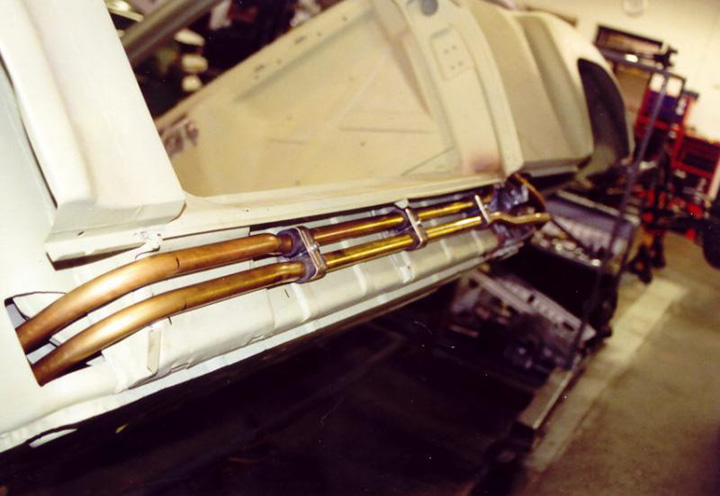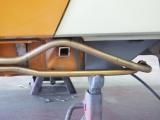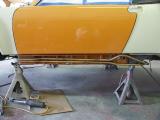Printable Version of Topic
Click here to view this topic in its original format
914World.com _ 914World Garage _ 914-6 GT oil line specs
Posted by: forrestkhaag Oct 5 2016, 03:59 PM
I am wondering if anyone has a good spec on the ID/OD for the two brass lines running to and from the front oil cooler? See Pix from P-Base for reference / I will be using AN fittings at the working ends for my flexible connections to the cooler and the thermostat and oil tank etc.. And does anyone know generally what the oil pressure is (hot) going to the front oil cooler??
I could also makes kit-sets for other installations if anyone is interested / Once I know how the factory did the job and I can accurately replicate the same or similar quality and product.....
Thanks in advance for the input.
![]()
Attached image(s)


Posted by: forrestkhaag Oct 5 2016, 04:55 PM
![]()
Posted by: johnhora Oct 5 2016, 05:04 PM
I think they were the same size as the 911S front cooler lines and used the same support clamps and rubber insulators..
Posted by: Mark Henry Oct 5 2016, 09:15 PM
I believe it's 3/4" (19mm) tube, oil pressure is not overly high, just what ever the oil filter and cooler causes.
Dry sump, the scavenge line is just dumping into the tank after the filter.
Posted by: Catorse Oct 5 2016, 10:24 PM
AN Fittings convert to actual sizes. Look it up.
On my built up 2.7, I went with AN line and braided hose. The sizes were AN 12 and AN16, and it seems to be cooling really well. The 16 is the pressure, the 12 is the scavenge. Those would be the MIN.
If I was doing a hotter motor (i.e. larger) I would go 16/16 or even 16/20
Posted by: pete000 Oct 5 2016, 10:38 PM
Elephant Racing makes this kit, but not cheap !
Posted by: Mark Henry Oct 6 2016, 12:18 AM
The 16 is the pressure, the 12 is the scavenge.
You are kind of thinking wrong on this, the whole circuit is the scavenge side.
The pressure side is the oil system within the engine, after it returns from the tank.
The only time you see really high pressures in the scavenge circuit is on cold start up when the oil is thick and the engine sump is full of oil. The line thermostat should be taking care of this, protecting the cooler, by sending the oil direct to the tank. When the engine is running and hot it's mostly foamy oil going through the lines to/from the cooler. The screen inside the tank separates the air from the oil.
Dry sump...now if we are talking wet sump, like in a type 4 engine with a front cooler, then yes the whole circuit is part of the pressure side.
A wet sump only has a pressure side.
Posted by: Catorse Oct 6 2016, 09:31 AM
The 16 is the pressure, the 12 is the scavenge.
You are kind of thinking wrong on this, the whole circuit is the scavenge side.
The pressure side is the oil system within the engine, after it returns from the tank.
The only time you see really high pressures in the scavenge circuit is on cold start up when the oil is thick and the engine sump is full of oil. The line thermostat should be taking care of this, protecting the cooler, by sending the oil direct to the tank. When the engine is running and hot it's mostly foamy oil going through the lines to/from the cooler. The screen inside the tank separates the air from the oil.
Dry sump...now if we are talking wet sump, like in a type 4 engine with a front cooler, then yes the whole circuit is part of the pressure side.
A wet sump only has a pressure side.
I had it backwards (it was late).
The 16AN goes into the oil cooler on the side of the engine. The 12 comes out the passenger side and to the FMOC.
Posted by: Mark Henry Oct 6 2016, 05:27 PM
It's cool I get things ass-backwards all the time ![]()
Forresthaag AN-12 should be good to the tank and/or remote front cooler, both ways. You really need to use a thermostat for a front cooler.
AN-16 from the tank back into the engine.
If you were to use a front sump tank, say in a race app, you would use a minimum -16 return line, or even bigger as that's a long run.
Personally I'd never use a front sump in anything but a race car.
Posted by: Catorse Oct 6 2016, 07:46 PM
It's cool I get things ass-backwards all the time
Forresthaag AN-12 should be good to the tank and/or remote front cooler, both ways. You really need to use a thermostat for a front cooler.
AN-16 from the tank back into the engine.
If you were to use a front sump tank, say in a race app, you would use a minimum -16 return line, or even bigger as that's a long run.
Personally I'd never use a front sump in anything but a race car.
Why? My setup is a Petersen tank up front. No issues yet, but the entire system is 100% new (as is the rest of the car). Runs great, good pressure. Lots of clean oil.
Posted by: stugray Oct 7 2016, 07:06 AM
I have a slightly related question:
Can I use 5/8" Aluminum tube (10-AN like this: https://www.summitracing.com/parts/sum-g2558/overview/)
for high pressure (up to ~100 PSI) oil lines?
You can flare the tubing and add AN fittings.
I was wondering if I could replace a maze of 10-AN fittings and braided stainless hose with some of this.
I know that Al Tube is acceptable on aircraft for oil, but is it a different type?
Posted by: Catorse Oct 7 2016, 09:07 AM
I have a slightly related question:
Can I use 5/8" Aluminum tube (10-AN like this: https://www.summitracing.com/parts/sum-g2558/overview/)
for high pressure (up to ~100 PSI) oil lines?
You can flare the tubing and add AN fittings.
I was wondering if I could replace a maze of 10-AN fittings and braided stainless hose with some of this.
I know that Al Tube is acceptable on aircraft for oil, but is it a different type?
I have some of that line. Not bad stuff, but for an oil line that's WAY too small. You will also need hose ends for vibration purposes on each end of that since that tube is super rigid, and by the time you're done you have about DOUBLE as many AN fittings as you would have if you had just used hose.
Posted by: stugray Oct 7 2016, 03:25 PM
I have a slightly related question:
Can I use 5/8" Aluminum tube (10-AN like this: https://www.summitracing.com/parts/sum-g2558/overview/)
for high pressure (up to ~100 PSI) oil lines?
You can flare the tubing and add AN fittings.
I was wondering if I could replace a maze of 10-AN fittings and braided stainless hose with some of this.
I know that Al Tube is acceptable on aircraft for oil, but is it a different type?
I have some of that line. Not bad stuff, but for an oil line that's WAY too small. You will also need hose ends for vibration purposes on each end of that since that tube is super rigid, and by the time you're done you have about DOUBLE as many AN fittings as you would have if you had just used hose.
I currently have 12AN Aramid/steel braid flex lines lines running from the engine bay pass side through the heater vent hole to the front for oil coolers and back (almost 35 feet total in the loop).
The 12AN then gets necked down at a bracket on the engine front cooler housing to 10AN.
The 10AN then goes into/out of the engine at a cooler blockoff plate that has 3/8" NPT fittings.
So what I would like to know basically is: If I can build it out of 10AN fittings and SS hose, can I then just duplicate the plumbing using bent Aluminum tubing and flare nuts?
Could I use a roll of Al. tubing to run from the front to the back like the copper/brass?
What are the drawbacks?
One I can think of is metal tubing might fail more catastrophically where the hose is more likely to begin to leak enough to be noticed before giving up?
Posted by: Mark Henry Oct 7 2016, 03:29 PM
Stugray's application is for a /4, so AN-10 (5/8") would be acceptable, but the consensus is you may do a six one day, so while you are in there why not just do AN-12 (3/4").
Wet sump means there is always high pressure, even hot it should be 10 psi per 1000 rpm, on cold start-up you easily see over 100 psi.
.035 wall in soft aluminum, it just has to rub in one place and you will have a hole.
Also, like copper, aluminum is subject to work hardening and should be annealed after bending.
With a wet sump try to limit your bends and how sharp they are to help flow. This doesn't matter as much with a dry sump scavenge circuit because it only has to keep up with the tank.
Why not use steel hydraulic tubing?
Catorse nothing really against the front sump, I just like my trunk and prefer stock-ish solutions to things like this in a street car.
Posted by: Harpo Oct 8 2016, 07:52 AM
I really like the idea of the hand bent aluminum lines for my 4. Although I do wish it was a bit larger.
David
Posted by: stugray Oct 8 2016, 12:48 PM
I really like the idea of the hand bent aluminum lines for my 4. Although I do wish it was a bit larger.
David
The largest I can find in coils is 5/8" (10AN).
If you wanted to run larger mostly straight runs, I think we would need to buy straight tube and weld AN fittings to the ends.
Aircraft spruce seems to have a good selection of both straight tube and coil (versatube):
http://www.aircraftspruce.com/catalog/mepages/3003versatube.php
Powered by Invision Power Board (http://www.invisionboard.com)
© Invision Power Services (http://www.invisionpower.com)
